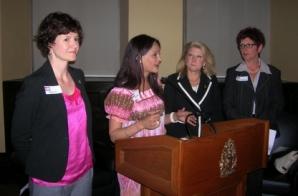Four female MPs from all four parties came together to launch the HIV/AIDS and TB (HAT) caucus on Monday night. Kicking things off were speeches by Stephen Lewis, former UN Special Envoy for HIV/AIDS in Africa, and James Orbinski, founder of Dignitas International and former president of Doctors Without Borders.
“It’s an all-party caucus that has come together around a global health issue, and in coming together, they’re recognizing their non-partisan responsibility to deal with the issue,” says Orbinski.
“If you can begin with a recognition of your common starting ground, then you can at least approach your differences in solutions with a common intent, which is to reach an end that will actually address the problem.”
Orbinski adds that the lack of such an approach has led to the current crisis around affordable treatments for HIV and TB. TB is of particular concern because co-infection is one of the leading killers of people with HIV.
Liberal MP Ruby Dhalla spearheaded the initiative, after a trip she took to South Africa with Results Canada, an anti-poverty group.
“Seeing the devastation and impact that HIV/AIDS and also in connection, co-infection with TB has caused on young children, on mothers, on fathers, on families,” Dhalla says of the trip. “When I was leaving, one of the young girls that I met — I gave her a Canadian flag — and she turned around and said to me please help us.”
The other co-chairs include MPs Megan Leslie from the NDP, Lois Brown from the Conservatives, and Johanne Deschamps from the Bloc Quebecois.
There was a sense of urgency to launching the caucus given the upcoming G8 and G20 meetings, and the focus on maternal and child health that will be featured there.
“You can’t have a conversation around maternal and child health unless you’re also going to look at HIV/AIDS and TB — in particular TB,” says Leslie.
Despite concerns that much of the attention to HIV has become an international issue, the caucus plans to keep a focus on the domestic HIV situation as well as the international crisis.
“They’re very aware in Canada, six years ago there were 55,000 HIV positive people,” says Orbinski. “Today there are 67,000 HIV-positive people, and that increase is largely among First Nations people. I know, having talked to the four leaders of the caucus, that they’re very aware of that particular issue, and are completely committed to addressing the global as a local issue.”
Richard Elliott of the HIV/AIDS Legal Network agrees. “We certainly are putting forward a number of ideas to them, and hope that they’ll take them up — we’ll work with them on that. Because we work on both domestic and international, we’ll push them to do the same, and I think they will actually.”
Leslie acknowledges Elliot’s contribution. “They’ve given us some really great ideas for different things that we’ll be able to do next year,” she says.
In Canada, gay, bisexual and other men who have sex with men comprised the greatest proportion of new HIV infections in 2008: 44 per cent, according to the Public Health Agency of Canada. That was down slightly from 45 per cent in 2005.


 Why you can trust Xtra
Why you can trust Xtra


